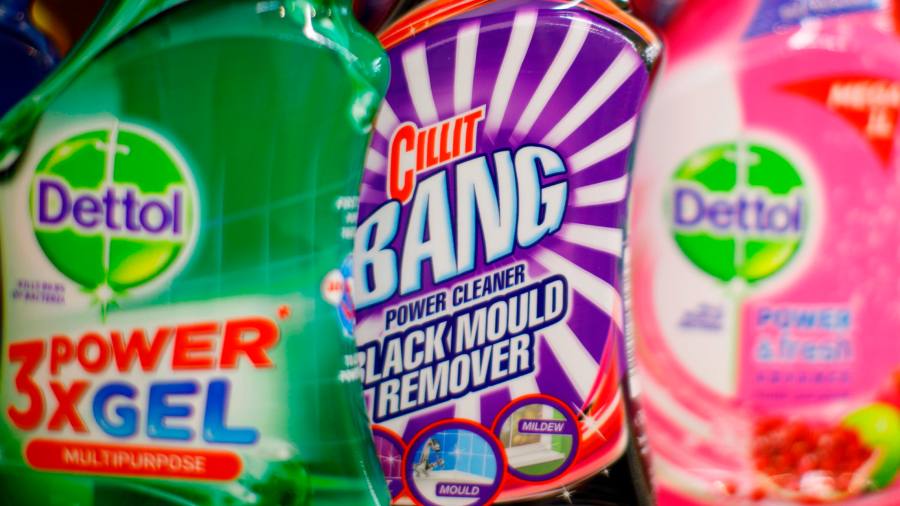
Households are forgoing air fresheners and vitamins during the cost of living squeeze, Reckitt Benckiser said on Wednesday, becoming the latest consumer goods group to post a decline in sales volumes.
Jeff Carr, finance director, said that while consumers were under “tremendous” financial pressure, the UK-based company had little choice but to increase prices almost 10 per cent on average in response to an “unprecedented” increase in its own costs.
Sales volumes at the maker of Cillit Bang cleaner, Clearasil skin care and Finish dishwasher tablets fell more than expected in the third quarter, down 4.6 per cent.
Much of this was driven by lower sales of its Lysol disinfectant products in the US compared with the same period a year earlier during the spread of the Delta variant of Covid-19.
Even excluding Lysol, volumes declined 1 per cent. Carr cited lower consumption of vitamins and minerals including Neuriva — marketed as an “holistic brain-health regimen” — and Air Wick fragrances.
Shoppers were “buying a little bit less” of more discretionary products, he said. “They’re looking after their budgets and therefore you see one or two categories where there is some volume softness.”
Sharp rises in energy and raw material costs have left consumer goods companies with a dilemma on how much of the financial pain to pass on to shoppers.
Carr said Reckitt, whose other products include Durex condoms and Dettol cleaning products, was trying to be “responsible” in setting prices. Reckitt’s cost of goods have risen almost 20 per cent.
Switzerland’s Nestlé and US-based Procter & Gamble have also reported a decline in sales volumes, suggesting that some consumers are rethinking whether to pay for branded consumer goods.
However, Carr said cheaper supermarket own-branded goods were “not the beneficiary” in many of Reckitt’s categories and that volumes “remain very resilient”.
He pointed to the enduring popularity of brands such as Nurofen painkillers and Strepsils throat lozenges, as well as dishwasher tablets.
The price increases helped Reckitt generate net revenues of £3.74bn in the third quarter, a like-for-like increase of 7.4 per cent from the same period last year.
The group also narrowed its target for full-year like-for-like net revenue growth to a range between 6 per cent and 8 per cent, compared with a previous target of 5 per cent to 8 per cent.
Analysts noted that consensus forecasts were already near the top end of the range. Shares in the FTSE 100 company fell 4.1 per cent in morning London trading, making it one of the worst performers of the day.
Reckitt is being run temporarily by Nicandro Durante, a former chief executive of British American Tobacco, while the company seeks a permanent replacement for Laxman Narasimhan, who left to lead US-based coffee chain Starbucks.